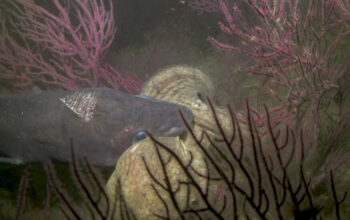
Such signals could help the dolphins home in on prey hiding on the seafloor. Bottlenose dolphins perform what’s called crater feeding, said Denise Herzing, a marine mammalogist at the Wild Dolphin Project in Florida who wasn’t involved with the study. “They dig,” she said. “They put their beaks down into the sand, almost up to the eyeballs, and pull out these eels.” Sand may make it harder for dolphins to detect buried fish through echolocation, she said.
Other researchers urged caution. The study used two dolphins, and “we do not know whether this ability is actually used in the wild,” said Juliana López-Marulanda, a marine biologist at University Paris Nanterre.
Dolphins may also use electrosensitivity to navigate. Dr. López-Marulanda and others have observed that dolphins can sense magnetic fields. Because they have bits of magnetic material in their bodies, the electric sense may allow them to feel changes in the Earth’s magnetic field and use something like a magnetic map.
Dr. Dehnhardt wonders if electrosensing may explain mass strandings of healthy whales and dolphins. Researchers have noticed links between shifts of the magnetic field, such as during solar storms, and mass strandings. “This may, for the first time, explain on a sensory basis how this really occurs,” he said. Such strandings don’t occur in baleen whales that — unlike their toothed cousins — use the whiskers they’re born with across their lives, he noted.
Understanding dolphin senses better could help protect the animals, Dr. López-Marulanda said. For instance, once sharks’ electrosensitivity was discovered, some fishing fleets added electromagnetic devices to nets to keep sharks away. Perhaps something similar may be possible with dolphins, although they are much less sensitive, she said.
For an animal that has received plenty of research attention, it’s exciting to spot a new sense.
“Everything has been worked on this species,” Dr. Dehnhardt said. “And still there is something new that we can discover.”



